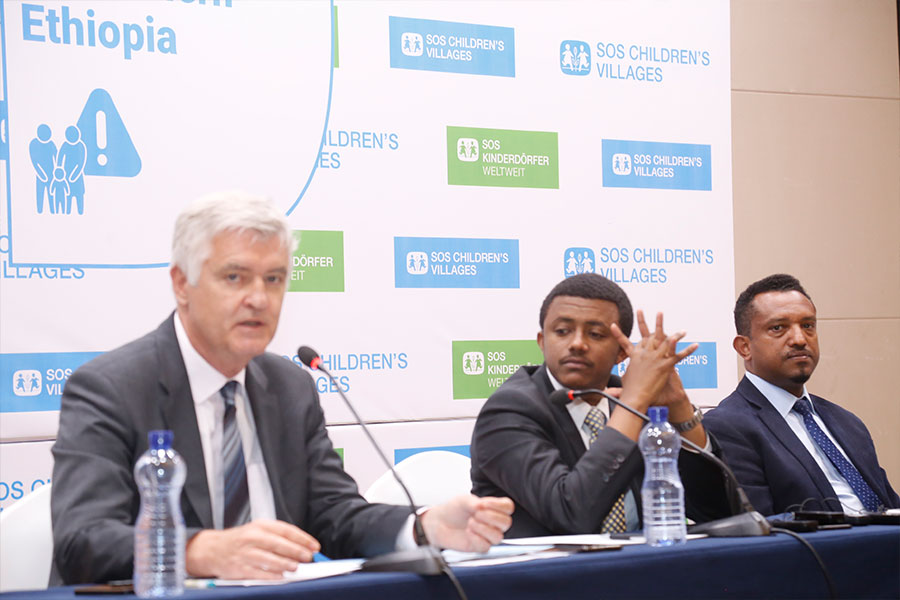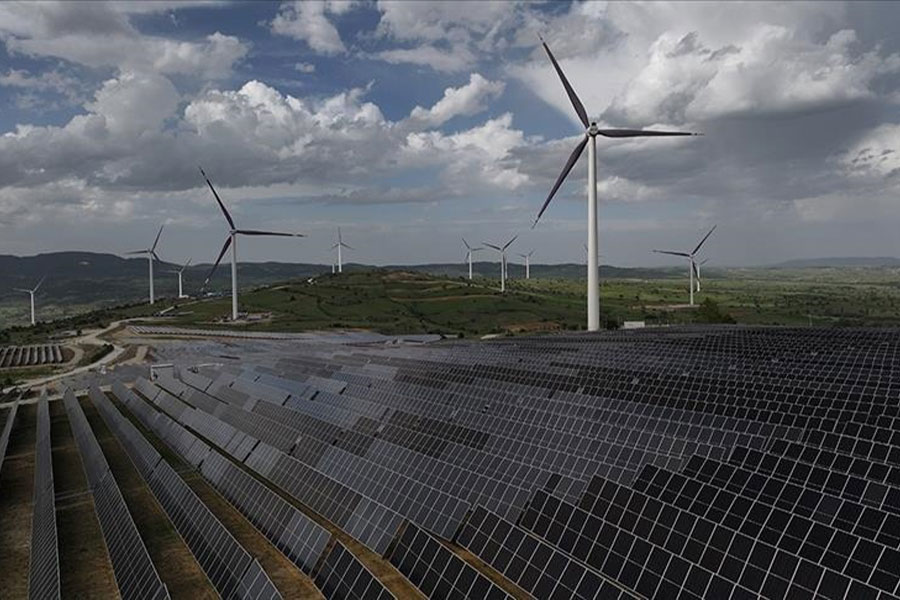
Viewpoints | Jul 20,2024
Oct 5 , 2024
By Mette Frederiksen , Mia Amor Mottley
Around the world, we are witnessing the devastating effects of changing temperatures. Droughts, floods, and sweltering heat are taking lives, eroding hard-earned socioeconomic gains, and leaving countries' future hanging in the balance. Worse, those who have contributed the least to the climate crisis are being hit the hardest.
The tasks for all countries are clear: They should strengthen their green ambitions to limit global warming and build resilience against mounting climate-related hazards. But that will require mobilising finance on a massive scale.
At last year's United Nations Climate Change Conference in Dubai (COP28), governments committed to "transitioning away from fossil fuels in energy systems, in a just, orderly, and equitable manner, accelerating action in this critical decade, so as to achieve net zero by 2050." Looking at this month's UN Summit of the Future and ahead to COP29 in November, the need to reform the global financial architecture and set an ambitious new goal for international climate finance has become even more apparent. Both are essential to deliver on the key tasks of climate mitigation and climate adaptation.
We know that it is possible to shift from fossil energy to renewables at the necessary speed and scale. Three decades ago, Denmark was heavily reliant on oil and gas. Yet renewables now account for 90pc of its electricity consumption, and are estimated to account for 110pc in 2030. At the same time, Denmark's booming wind industry has driven a jobs transition, creating a more sustainable and greener labour market.
Given these benefits, the global climate financing gap should be seen as an opportunity. Emerging-market and developing economies (EMDEs), excluding China, will need an estimated 2.4 trillion dollars annually by 2030 for climate, and nature-related investments. These investments could drive climate-positive growth, help countries manage the effects of climate change, create decent jobs, expand capital markets, and strengthen resilience, all at the same time.
The good news is that many EMDEs are home to some of the best climate-related investment opportunities. Technology tipping points are increasingly making low-carbon, nature-positive, equitable solutions commercially attractive.
The bad news is that annual investments in clean energy in EMDEs (excluding China) need to increase sevenfold by 2030 to align with the Paris climate agreement. While Africa boasts 60pc of the best solar resources globally, it hosts only one percent of installed solar PV capacity. And the figures are even worse when it comes to adaptation. Between 2016 and 2021, only nine percent of the private climate finance mobilised across developing countries went toward adaptation. To say that we are not doing enough is putting it mildly.
What will it take for COP29 to deliver on climate finance?
The Bridgetown Initiative outlines ways to finance not just climate action but also the rest of the UN Sustainable Development Goals (SDGs). Launched by Barbados in 2022, the Bridgetown Initiative has been supported since its inception by a growing number of partners from the public, private, and third sectors. Looking ahead, we should dramatically increase the availability of, and access to, tools that have proven effective in unlocking the necessary investment.
For example, using public funds to derisk private investment – a method known as blended finance – is a tried and tested solution. Experience shows that every public dollar spent this way can mobilise around five dollars of commercial capital for climate investments. Now, we should deploy such mechanisms on a much larger scale, and quickly. To that end, we call on the organisations that make up the international financial architecture for development – including the World Bank Group and national and other development finance institutions (DFIs) – to pursue three changes.
These institutions should fund the development of a massive pipeline of green investments and climate adaptation projects. This requires becoming more comfortable assuming greater risk, such as by boosting investment in early-stage large-scale projects and new technologies in EMDEs. Funding and scaling up private project developers will help create the financing ecosystem needed to catalyse many more green investments. It will also help reduce private investors' perceptions of financial and operating risks in developing countries.
To unlock private finance, DFIs should scale up the use of proven de-risking instruments. This includes loan guarantees, insurance, and other products that address perceived country risk and concrete barriers to project bankability. Setting a private capital "mobilisation mandate" for multilateral development banks and DFIs would encourage the use of financial instruments that can unlock private capital for climate projects.
DFIs could mobilise external and domestic pools of capital, such as pension funds in developing countries. These local players often sit on the sidelines because of a thin investment pipeline or insufficient incentives to enter the market. Yet they know their markets' opportunities and risks the best, and they would be there for the long haul. At the same time, more blended finance instruments in local currency would help draw external actors into green and sustainable investments in EMDEs.
To leverage blended finance faster and on a wider scale, Denmark, together with the other Nordic countries and the United States (US), launched the Investment Mobilisation Collaboration Arrangement at COP28. By gathering participating countries' funds into competitive bids directly to the capital markets, the alliance aims to channel billions of dollars in new climate finance toward mitigation and adaptation by 2026. This will allow countries to increase their environmental, social, governance (ESG) impact and mobilise private capital faster and on a much larger scale.
Securing tangible commitments to deploy the full range of blended finance solutions is a key focus of the Bridgetown Initiative and a Danish priority in climate finance. Given the opportunity and the urgent need for action, this approach should be front and centre in international discussions leading up to COP29 in Baku. We invite governments, philanthropists, and private-sector partners to join us in shaping a meaningful contribution.
PUBLISHED ON
Oct 05,2024 [ VOL
25 , NO
1275]

Viewpoints | Jul 20,2024

Editorial | Sep 02,2023

Fortune News | May 06,2023

Commentaries | Apr 04,2020

Commentaries | Sep 06,2020

Covid-19 | Apr 08,2020

Editorial | May 08,2020

Radar | Jun 11,2022

Viewpoints | Feb 06,2021

Commentaries | Aug 23,2025

Photo Gallery | 177820 Views | May 06,2019

Photo Gallery | 168033 Views | Apr 26,2019

Photo Gallery | 158742 Views | Oct 06,2021

My Opinion | 137014 Views | Aug 14,2021
Commentaries | Oct 25,2025

Dec 22 , 2024 . By TIZITA SHEWAFERAW
Charged with transforming colossal state-owned enterprises into modern and competitiv...

Aug 18 , 2024 . By AKSAH ITALO
Although predictable Yonas Zerihun's job in the ride-hailing service is not immune to...

Jul 28 , 2024 . By TIZITA SHEWAFERAW
Unhabitual, perhaps too many, Samuel Gebreyohannes, 38, used to occasionally enjoy a couple of beers at breakfast. However, he recently swit...

Jul 13 , 2024 . By AKSAH ITALO
Investors who rely on tractors, trucks, and field vehicles for commuting, transporting commodities, and f...

Oct 25 , 2025
The regulatory machinery is on overdrive. In only two years, no fewer than 35 new pro...

Oct 18 , 2025
The political establishment, notably the ruling party and its top brass, has become p...

Oct 11 , 2025
Ladislas Farago, a roving Associated Press (AP) correspondent, arrived in Ethiopia in...

Oct 4 , 2025
Eyob Tekalegn (PhD) had been in the Governor's chair for only weeks when, on Septembe...

Oct 25 , 2025 . By YITBAREK GETACHEW
Officials of the Addis Abeba's Education Bureau have embarked on an ambitious experim...

Oct 26 , 2025 . By YITBAREK GETACHEW
The federal government is making a landmark shift in its investment incentive regime...

Oct 27 , 2025
The National Bank of Ethiopia (NBE) is preparing to issue a directive that will funda...

Oct 26 , 2025 . By SURAFEL MULUGETA
A community of booksellers shadowing the Ethiopian National Theatre has been jolted b...